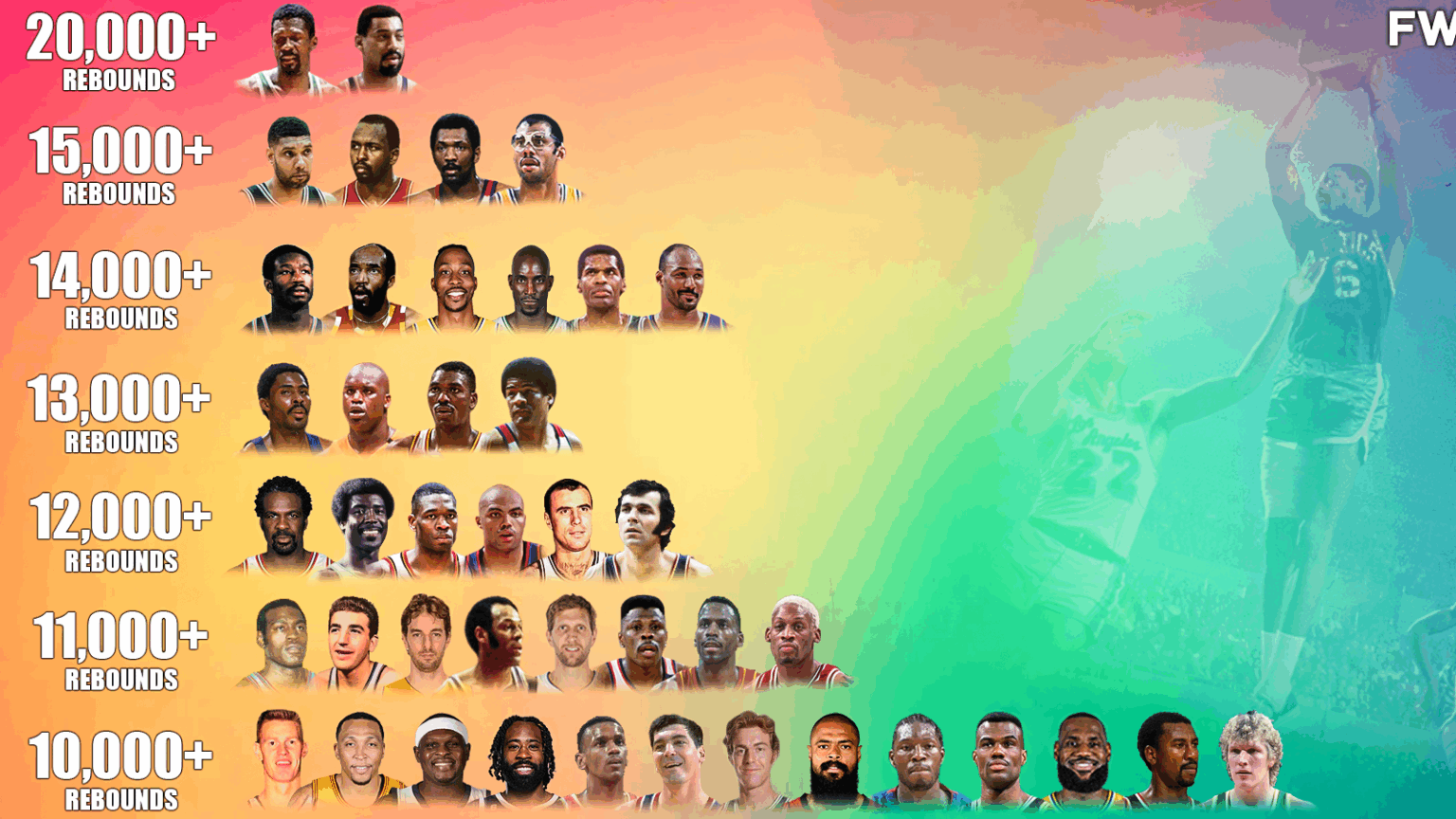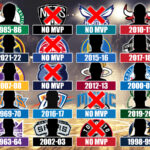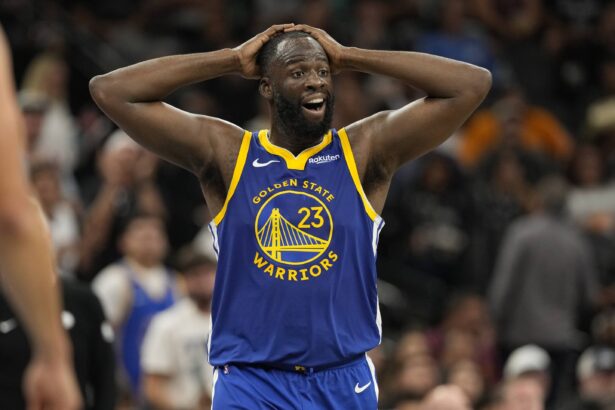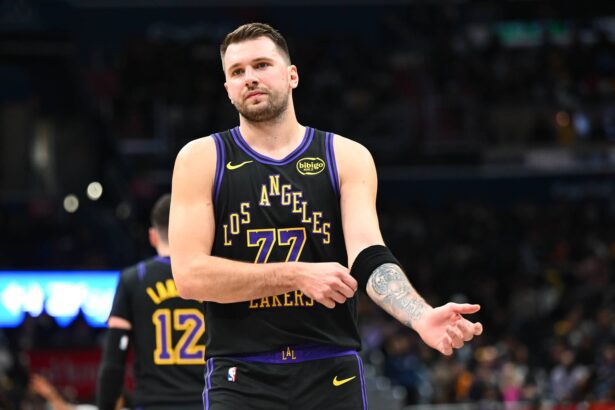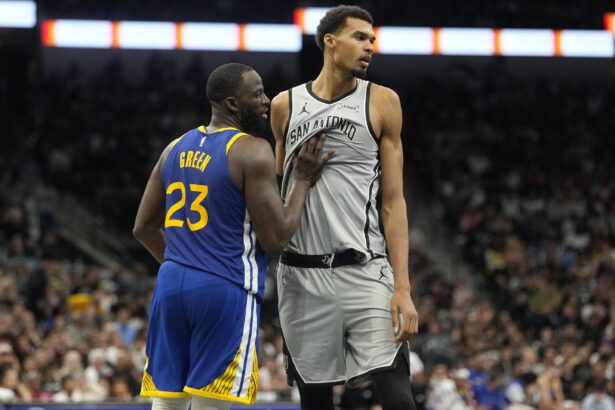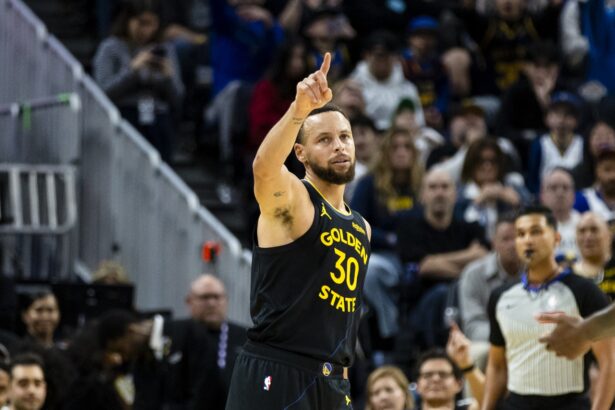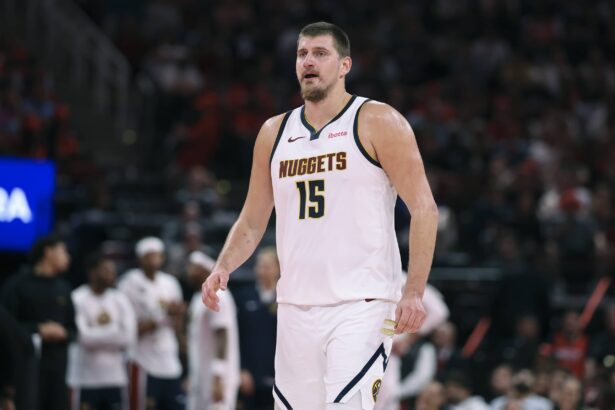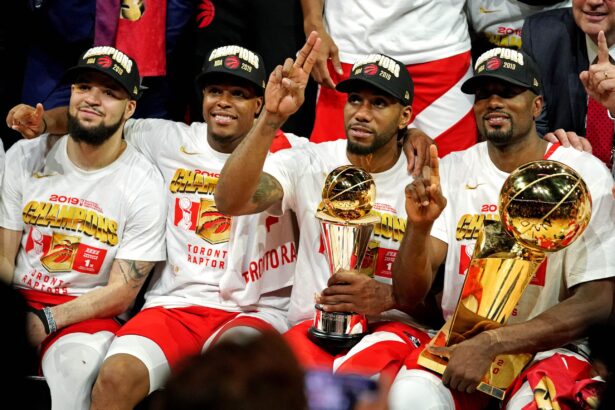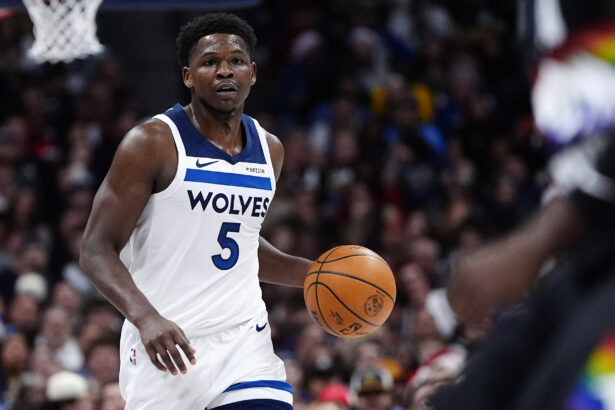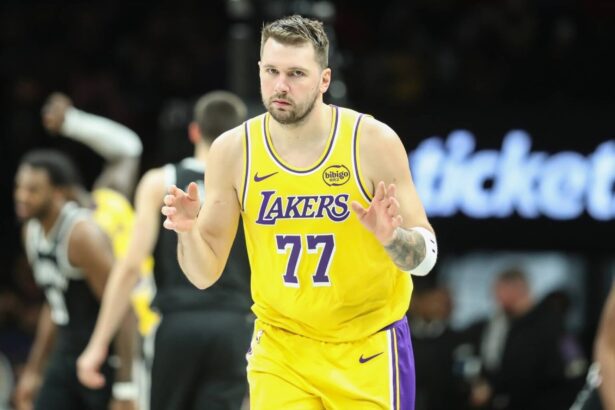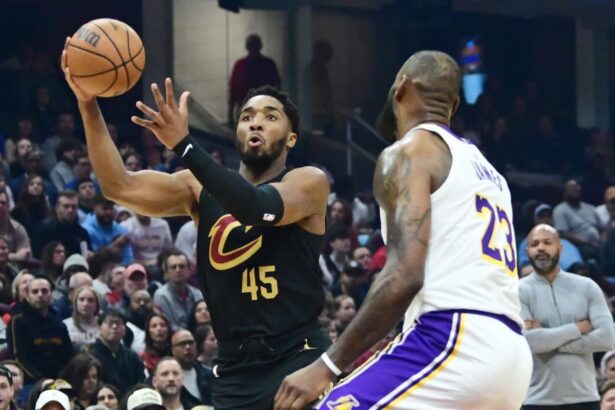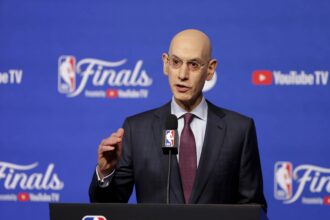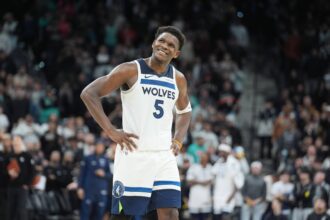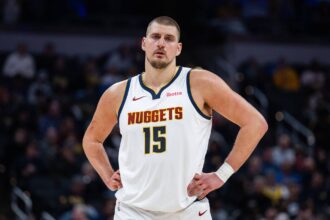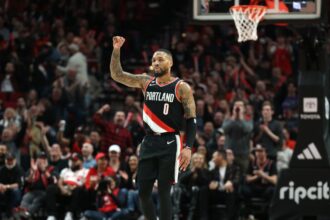Easily the least sexy and unglorified stat in all of basketball is rebounds. Most attribute collecting a lot of rebounds to a player’s height, athleticism, and effort. The automatic assumption from most is that every 7-footer with a little bit of athleticism is going to be a good rebounder in the NBA. That is not the case. Physicality and rebounding go hand-in-hand and still mean something in today’s game, contrary to the narratives pushed around for the last few years. Players must be willing to fight to earn extra possessions for their team on the offensive end and fight to change possession on the defensive side. Rebounding is essential to victory for any team regardless of what is “sexy” and what’s not.
- Tier 7 – 10,000+ Rebounds
- Red Kerr, Shawn Marion, Zach Randolph, DeAndre Jordan, Otis Thorpe, Bill Laimbeer, Dave Cowens, Tyson Chandler, Ben Wallace, David Robinson, LeBron James, Caldwell Jones, Jack Sikma
- Tier 6 – 11,000+ Rebounds
- Bill Bridges, Dolph Schayes, Pau Gasol, Elgin Baylor, Dirk Nowitzki, Patrick Ewing, Kevin Willis, Dennis Rodman
- Tier 5 – 12,000+ Rebounds
- Charles Oakley, Paul Silas, Dikembe Mutombo, Charles Barkley, Bob Pettit, Jerry Lucas
- Tier 4 – 13,000+ Rebounds
- Buck Williams, Shaquille O’Neal, Hakeem Olajuwon, Wes Unseld
- Tier 3 – 14,000+ Rebounds
- Walt Bellamy, Nate Thurmond, Dwight Howard, Kevin Garnett, Robert Parish, Karl Malone
- Tier 2 – 15,000+ Rebounds
- Tim Duncan, Moses Malone, Elvin Hayes, Kareem Abdul-Jabbar
- Tier 1 – 20,000+ Rebounds
- Bill Russell, Wilt Chamberlain
Recently, we ranked the NBA players with the most career playoff points by tiers. Today, we are going to show some recognition to the players who excelled at rebounding. These players pulled down more missed shots than any other players in NBA history and gave their teams a better shot at being successful because of it. These are the players who could be counted on to fight for their teams every time they stepped onto the court and into the paint.
This is the ranking of the NBA players with the most career rebounds by tiers.
Tier 7 – 10,000+ Rebounds
Red Kerr, Shawn Marion, Zach Randolph, DeAndre Jordan, Otis Thorpe, Bill Laimbeer, Dave Cowens, Tyson Chandler, Ben Wallace, David Robinson, LeBron James, Caldwell Jones, Jack Sikma
The following players rank 42nd thru 31st on the NBA’s all-time rebounding list and have grabbed between 10,000 rebounds and 11,000 rebounds in their careers. The first of these players is Red Kerr, who played 12 seasons in the NBA from 1955 thru 1966. Kerr was a three-time All-Star with the Syracuse Nationals and won an NBA championship in 1955. His best stretch as a rebounder came from 1957 thru 1964, when he averaged 12.9 RPG and peaked at 14.7 RPG in 1962. Kerr pulled down a total of 10,092 rebounds in his career.
Shawn Marion was mostly known for being an elite two-way player with the Suns and Mavericks during the 2000s and 2010s. Marion was a four-time All-Star and two-time All-NBA Team selection during his career with the Suns and went on to win an NBA championship in 2011 with Dallas. Marion’s rebounding has always flown under the radar, much like his all-around abilities did for most of his career. Marion averaged 8.7 RPG for his career and recorded four different seasons with at least 10.0 RPG.
Zach Randolph had a tumultuous beginning of his career with the Portland Trail Blazers that presented issues such as fighting with teammates and other distractions. In his six seasons there, however, Randolph would record multiple seasons with at least 10.0 RPG and averaged 7.7 RPG over that time. With the Grizzlies from 2010 thru 2017 is when he would peak as a player. He made two All-Star Teams and an All-NBA Team while averaging 10.2 RPG and peaking at 12.2 RPG in 2011. Randolph ranks 40th all-time in rebounds with 10,208 for his career.
DeAndre Jordan is still currently active in the NBA, having made his debut in 2008 with the Clippers. At one point in time, Jordan was one of the best rebounders in the game. Now, it looks like he may end up in China by next year after spending a decade and a half in the NBA. The 2014 season thru the 2018 season was Jordan’s peak as a rebounder with the Clippers as he averaged 14.2 RPG and won back-to-back rebounding titles in 2014 and 2015. He averaged over 15.0 RPG twice in his career and pulled down over 10,300 total rebounds.
Otis Thorpe is one of the unsung heroes of the 1994 NBA champion Houston Rockets. Thorpe spent the first four seasons of his career with the Kings from 1985 thru 1988, where he would have two seasons of over 10.0 RPG and averaged 8.2 RPG over those four seasons. With the Rockets from 1989 thru 1995, Thorpe was the team’s second-best rebounder averaging 9.7 RPG in his six-and-a-half seasons with Houston and having three seasons with over 10.0 RPG. Thorpe would earn one All-Star selection in 1992 with Houston and averaged 9.9 RPG in the 1994 playoffs to become an NBA champion.
Bill Laimbeer was known for being one of the faces of the most-hated Detroit Pistons team ever, the Bad Boys. As a brutal and physical presence on the interior, Laimbeer had no issues doing the dirty work for his team. Laimbeer played 12 and a half seasons with the Pistons from 1982 thru 1994 and averaged 10.1 RPG during those seasons. He won one rebounding title in 1986 when he averaged 13.1 RPG and averaged 11.3 RPG from 1982 thru 1988. Laimbeer would win two championships with Detroit in 1989 and 1990 and earned four trips to the NBA All-Star Game.
Dave Cowens played just 11 seasons in the NBA which makes the fact he grabbed over 10,000 rebounds in total much more impressive. Cowens played for 10 seasons with the Celtics from 1971 thru 1980, winning two NBA championships and the 1973 MVP award. Cowens averaged 13.6 RPG for his career and 10.0 RPG or more in eight of his 11 years in the NBA. From 1971 thru 1978, Cowens was one of the best in the NBA on the boards with 15.2 RPG and two seasons with 16.0 RPG included.
Tyson Chandler was on an NBA court for two reasons. He was an elite interior defender and Defensive Player of the Year, and he was also one of the league’s best rebounders. Although he never won a rebounding title, Chandler still averaged 9.0 RPG for his career with five seasons of over 10.0 RPG. With his rebounding being one of the best parts of his game, it allowed him to have a substantial 19-year career. He earned one All-Star selection as well as three All-Defensive Team selections and an All-NBA team selection. In 2011, Chandler helped the Mavericks become NBA champions for the first time while pulling down 9.2 RPG in the playoffs.
When we speak about some of the greatest defensive centers in NBA history, Ben Wallace is one of the players we are referring to. Wallace won a total of four Defensive Player of the Year awards in his career as well as back-to-back rebounding titles in 2002 and 2003. Wallace began to break out as a rebounder and defender when he joined the Pistons in 2001. He would average 12.6 RPG in his first seven seasons with Detroit and 13.3 RPG in five playoff appearances as well. Wallace averaged 9.6 RPG over the course of 16 seasons in the NBA and helped anchor the 2004 Detroit Pistons to an NBA championship.
David Robinson is still one of the most underrated big men in NBA history to this day. Robinson spent 14 seasons in the NBA, all with the San Antonio Spurs, where he would go on to win two NBA championships in 1999 and 2003. Robinson dominated the first decade of his career, averaging 11.5 RPG over the span of 10 seasons from 1990 thru 1999. He won himself a rebounding title in 1991 with 13.0 RPG and won MVP in 1995, averaging 10.8 RPG. He averaged 10.0 RPG in nine of his 14 seasons and was named Defensive Player of the Year in 1992 as well as an All-Star 10 times and All-Defensive Team eight times.
The fact that LeBron James is on pace to record 40,000 points, 10,000 rebounds, and 10,000 assists for his career is something we may never see again. James has played almost every position that one can play on the court, and his otherworldly athleticism allowed him to be an exceptional rebounder. James ranks 32nd all-time in career rebounds with 10,667. He has averaged 7.5 RPG for his career in the regular season and 9.0 RPG for his playoff career, where he ranks among the top players to ever play the game. With four championships, four Finals MVPs, and four MVP awards, LeBron James’ rebounding does not get talked about enough when it comes to his GOAT case.
The final member of Tier 7 with 10,000+ rebounds is Jack Sikma. He played 14 seasons in the NBA from 1978 thru 1991 most notably with the Seattle SuperSonics from 1978 thru 1986. Sikma was a seven-time NBA All-Star from 1979 thru 1985 and averaged 17.7 PPG and 11.4 RPG over that time. In his 14 seasons, Sikma averaged at least 10.0 RPG eight times, including 10.8 RPG in his nine seasons with Seattle. He helped them capture the 1978 NBA championship and was named to one All-Defensive Team in 1982.
Tier 6 – 11,000+ Rebounds
Bill Bridges, Dolph Schayes, Pau Gasol, Elgin Baylor, Dirk Nowitzki, Patrick Ewing, Kevin Willis, Dennis Rodman
Kicking things off in Tier 6 with over 11,000 rebounds in his career is Bill Bridges. Having played 13 seasons in the NBA, Bridges was a three-time All-Star with the Hawks in the late 60s. From 1965 thru 1973, Bridges recorded nine straight seasons of grabbing at least 10.0 RPG and averaged 13.3 RPG during that time. Bridges would earn two All-Defensive Team selections in his career as well as an NBA championship with the Warriors in 1975.
Dolph Schayes is another one of the great rebounders the game has ever seen, as well as one of its better overall players. Schayes won his only career rebounding title during his second season in the NBA with the Syracuse Nationals, as he averaged 16.4 RPG in 1951. Schayes averaged at least 12.0 RPG every season for the first 11 seasons of his career and 13.1 RPG overall. His 11,256 rebounds rank 29th in NBA history, 200 rebounds ahead of Bill Bridges.
Pau Gasol is one of the most beloved figures in NBA history. From Memphis in his younger days to the days he delivered two NBA championships to the Lakers, everyone loved Pau. He was also one heck of a competitor on the court and was not afraid to fight for his share of rebounds. Gasol averaged 9.2 RPG for his career and had five seasons in which he recorded at least 10.0 RPG. Gasol would be named an All-Star six times as well as a four-time All-NBA Team selection.
Elgin Baylor was one of the first true superstars in NBA history. He was a perimeter player who played above the rim and put fans in the seats during a time that basketball needed it. As great of a scorer as Baylor was, he was an equally great rebounder who averaged 13.5 RPG over the course of his 14-year career. Over the first 12 seasons of his career, Baylor averaged 13.6 RPG and recorded four seasons with at least 15.0 RPG. His fierce style of play earned him 11 All-Star selections in his career and 10 All-NBA Team selections.
Dirk Nowitzki is known as one of the greatest power forwards in NBA history. Dirk changed the game with the way he could shoot the three during his career as he became the best big-man shooter that ever lived. He was also an avid rebounder during his prime and averaged 7.5 RPG for his career. Although he never reached 10.0 RPG in any season, 21 years of play at a high level is going to earn you some boards that begin to accumulate over time. Nowitzki’s place at 26th all-time in rebounds adds to his already incredible legacy.
Patrick Ewing just may be the greatest player in NBA history to never win an NBA championship. The versatile two-way big man is an icon in the City of New York, and rightfully so, as he was the Knicks’ identity for 15 years. As the physical and tough presence he was, Ewing averaged 9.8 RPG for his career and had nine seasons with at least 10.0 RPG. From 1990 thru 1998 with the Knicks, Ewing recorded all nine of those 10.0 RPG seasons and averaged 11.1 RPG overall. If his career had ended when he left the Knicks in 2000, Ewing would have been one of few players to average 20.0 PPG and 10.0 RPG for his career.
Another underrated member of the 90s and 2000s NBA has to be power forward Kevin Willis. He played his first 11 seasons in the NBA with the Hawks, where he became an All-Star in 1992 and averaged 9.7 RPG. Willis recorded five seasons in which he grabbed over 10.0 RPG and in 1992, pulled down an incredible 15.5 RPG. Willis would play until he was 44 years old in 2007 and was finally able to win a championship with the Spurs in 2003.
The final member of Tier 6 with 11,000+ rebounds in his career is one of the greatest rebounders ever, Dennis Rodman. It is surprising to see Rodman so low on this list, considering he is known for his defense and his ability to pull down rebounds. He studied rebounds like a quarterback studies defense in the NFL. He dominated rebounding in the NBA, winning seven straight rebounding titles from 1992 thru 1998 and averaging 16.7 RPG over those years. Rodman averaged 13.1 RPG for his career, which only lasted 14 seasons, and won five NBA championships in total between his time with the Pistons and Bulls, as well as two Defensive Player of the Year awards and two All-Star selections.
Tier 5 – 12,000+ Rebounds
Charles Oakley, Paul Silas, Dikembe Mutombo, Charles Barkley, Bob Pettit, Jerry Lucas
The following players rank 22nd to 17th all-time in career rebounds, and this tier is filled with some of the greatest players in NBA history. I am not referring to Charles Oakley in that sense, but he does start us off with just over 12,200 rebounds over the course of his 19-year career. Oakley was a member of the abysmal 1985-86 Bulls teams outside of Michael Jordan as well as the 90s Knicks, who were as tough and physical as anyone in basketball led by Oakley. For his career, Oakley grabbed 9.5 RPG and recorded six seasons with at least 10.0 RPG.
Paul Silas is another forgotten great as far as his playing career and not his coaching goes. Silas played 16 seasons in the NBA from 1965 thru 1980 with the Hawks, Suns, Celtics, Nuggets, and SuperSonics. Silas was a rebounding machine in his career who had eight seasons of 10.0 RPG or more. This included seven straight seasons from 1970 thru 1976, when he averaged 12.2 RPG over that span. Silas would earn two All-Star selections in his career as well as three NBA championships with Boston and Seattle.
Another one of the great defensive centers in NBA history falls into the top 20 in career rebounds with Dikembe Mutombo. Another four-time winner of the NBA’s Defensive Player of the Year award, Mutombo is one of the greatest shot-blockers ever. He is also one of the game’s best rebounders, who averaged 10.3 RPG for his career. In his 18 seasons in the NBA, Mutombo averaged at least 10.0 RPG for the first 11 of them, which included back-to-back rebounding titles in 2000 and 2001. Mutombo’s 10.3 RPG rank is pretty low in NBA history, but his total cannot be denied just yet from the top 20.
Charles Barkley’s nickname when he played was The Round Mound of Rebound. This was due to his physical nature in the paint and the way he just let himself get bigger, which he used to his advantage. Barkley, the 1993 MVP, was one of the NBA’s best rebounders during the 80s and 90s who averaged 11.7 RPG for his career. In his 16 seasons, Barkley managed to record 10.0 RPG every season aside from his 1985 rookie season, which is an incredible stretch unmatched by anyone below him on this list.
Before all of the great power forwards we have already mentioned even existed, Bob Pettit was the gold standard for the position in the NBA. Pettit was a two-time MVP and an NBA champion who became the only man to take down Bill Russell in an NBA Finals series. Pettit played just 11 seasons in the NBA but averaged 16.2 RPG for his career. Pettit recorded eight seasons of at least 15.0 RPG and became one of the very few players to ever average over 20.0 PPG and 20.0 RPG in a season in 1961.
The final member of Tier 5 with over 13,000 rebounds in his career is Jerry Lucas. Also, here on the heels of an 11-year NBA career, Lucas averaged 15.6 RPG for his career with the Cincinnati Royals, Warriors, and Knicks. Lucas would be a seven-time All-Star in his career as well as a five-time All-NBA Team selection. Lucas would record seven seasons of at least 15.0 RPG in his career, which includes back-to-back seasons of 20.0 PPG and 20.0 RPG in 1965 and 1966. From 1964 thru 1971, Lucas averaged 18.2 RPG, which was by far his most dominant stretch as a rebounder. He would win an NBA championship with the Knicks averaging just 7.5 PPG and 5.0 RPG in 1973.
Tier 4 – 13,000+ Rebounds
Buck Williams, Shaquille O’Neal, Hakeem Olajuwon, Wes Unseld
In Tier 4, we are graced with the presence of three former Finals MVPs, MVPs, and Hall Of Famers, and there is Buck Williams. If defense and rebounding were valued as much as producing on offense, Williams may just even be in the Hall Of Fame, he was that good. In his first six seasons with the Nets, Williams averaged at least 12.0 RPG every season and earned three All-Star selections and an All-NBA Team selection. He averaged 10.0 RPG for his career and only averaged less than 8.0 RPG in a season after turning 35 years old.
Shaquille O’Neal’s dominance is well-documented across our site over time. Shaq was a monster in the paint during his first 12 seasons in the NBA with the Magic and Lakers. With the Magic, Shaq averaged at least 11.0 RPG all four seasons and over 13.0 RPG twice. With the Lakers, he averaged 11.8 RPG and never recorded less than 10.0 RPG in all eight seasons. Shaq would win an MVP, three championships, and three Finals MVPs with the Lakers and another championship with the Heat in 2006.
Hakeem Olajuwon is a highly respected and feared individual in NBA history. He wasn’t feared or hated by fans, but opponents feared going up against him in the paint on both ends of the floor. The former MVP and two-time Finals MVP averaged 10.0 RPG in his first 12 seasons with the Rockets which included 12.2 RPG over that span and back-to-back rebounding titles in 1989 and 1990. Olajuwon had six career seasons with 12.0 RPG or more and three seasons with 13.0 RPG. It is part of why he is considered to be a top-three center in NBA history.
The final member of Tier 4 is a former MVP and Finals MVP with the Baltimore/Washington Bullets. Wes Unseld is one of the lowest-scoring MVPs and Finals MVPs in NBA history, but a huge reason why he was honored with those awards was his rebounding. Unseld won his MVP award as a rookie in 1969 when he averaged 18.2 RPG for the Baltimore Bullets. Unseld would average at least 10.0 RPG in 12 of his 13 NBA seasons and a rebounding title in 1975 with 14.8 RPG. He averaged 14.0 RPG for his career, which ranks seventh in NBA history.
Tier 3 – 14,000+ Rebounds
Walt Bellamy, Nate Thurmond, Dwight Howard, Kevin Garnett, Robert Parish, Karl Malone
Tier 3 is when we really begin to count the most elite rebounders in NBA history. Walt Bellamy was a 14-year NBA veteran and Hall of Famer who averaged 13.7 RPG in his career. He averaged 19.0 RPG as a rookie in 1962 and over 14.0 RPG for the next four consecutive seasons. Out of 14 seasons in the NBA, Bellamy recorded 10 with at least 10.0 RPG during his time with the Chicago Zephyrs, Baltimore Bullets, New York Knicks, Detroit Pistons, Atlanta Hawks, and New Orleans Jazz.
Nate Thurmond is another vastly underrated big man in NBA history. He ranks 11th all-time with 14,464 rebounds in his career and an average of 15.0 RPG. Thurmond also played 14 seasons in the NBA, including 11 for the Warriors, which he is most known for. Thurmond never won a rebounding title or NBA title, but he did lay claim to two 20.0 RPG seasons with the Warriors in 1967 and 1968. From 1965 thru 1974, Thurmond averaged 17.6 RPG while earning seven All-Star selections for the Warriors.
Dwight Howard is often mocked and ridiculed for his goofy personality off the court and his regression on it since the early 2010s. However, at his best, Howard could have been one of the greatest players in NBA history had things played out differently for him. Howard averaged 11.8 RPG for his NBA career and, from 2008 thru 2013, won five rebounding titles in six seasons averaging 13.7 RPG. Howard is a former three-time Defensive Player of the Year as well as a two-time Blocks champion, five-time All-Defensive Team selection, and an NBA champion with the Lakers in 2020.
Kevin Garnett was great at everything on the basketball court and went down as a top-five power forward in NBA history. Garnett’s best attributes were his defense, which included rebounding as dominantly as he did. Garnett averaged 10.0 RPG for his career and had nine seasons in which he hit that mark from 1999 thru 2007. Garnett won four rebounding titles from 2004 thru 2007, in which he averaged 13.3 RPG and won an MVP during that time. Garnett won a Defensive Player of the Year in 2008, the same year he helped Boston capture their first NBA title since 1986.
Robert Parish was a key member of the three-headed monster known as the 1980s Boston Celtics with Kevin McHale and Larry Bird. Parish was a feared presence on the interior for his physical brand of play and no-BS attitude. To be fair, Parish did log 21 seasons in the NBA, so his spot on here may be a bit inflated. However, at his best, Parish was a 10.0 to 10.5 RPG player who recorded 10 seasons, hitting that mark. Parish would win four NBA titles in his career with the Celtics and Bulls.
The final member of Tier 3 is a man who sits top three in points as well as seventh in rebounds. Karl Malone is one of the most consistent power forwards to ever play the game and averaged 10.1 RPG for his career. Of the 19 seasons he spent in the NBA, Malone had 10 in which he averaged at least 10.0 RPG. Malone would win two MVP awards in his career as well as earn 14 All-Star selections. His 18-year career with the Utah Jazz is still the best career of any player in franchise history, and his 10.2 RPG has a lot to do with why.
Tier 2 – 15,000+ Rebounds
Tim Duncan, Moses Malone, Elvin Hayes, Kareem Abdul-Jabbar
The fact that Tim Duncan sits as sixth all-time in rebounds is not a shocking fact as the greatest player to ever play the power forward position. Duncan played 19 seasons with the Spurs from 1998 thru 2016, and over his first 13 seasons, he didn’t record a single one with less than 10.0 RPG. Duncan would average 10.8 RPG for his career and sits this high all-time despite never winning a single rebounding title. It didn’t matter as he went on to win five NBA titles, three MVP awards, and two Finals MVP awards in his career.
Moses Malone may just be the greatest rebounder ever. I say that due to the fact that nearly half of his rebounds came on the offensive side of the ball. He holds the NBA record for offensive rebounds with 7,382 and averaged 12.3 RPG for his career. From 1979 thru 1985 with Houston and Philadelphia, Malone would win six rebounding titles in seven seasons and average 14.8 RPG. Also, during that time, he would win three MVP awards and an NBA championship in 1983 with a Finals MVP with the Sixers.
Elvin Hayes does not get enough credit for the impact he had on his team’s success throughout his 16-year career. Hayes averaged over 20.0 PPG for his career as well as 12.5 RPG. From his rookie season in 1969 thru 1980 with the Rockets and Bullets, Hayes averaged 14.2 RPG while winning rebounding titles in 1970 and 1974. He had four seasons with over 16.0 RPG and 12 seasons with at least 11.0 RPG in his career. Hayes won an NBA championship with the 1978 Washington Bullets and was a 12-time All-Star in his career.
The final member of Tier 2 is Kareem Abdul-Jabbar, who finished his career with 17,440 rebounds, the third-most in NBA history. Until recently, Kareem was the NBA’s all-time leading scorer who worked his way atop both of these lists over the course of 20 years with the Bucks and Lakers. Kareem averaged 11.2 RPG for his career and won one rebounding title in 1976. Kareem also began his career with 12 straight seasons of at least 10.0 RPG while recording four with over 16.0 RPG.
Tier 1 – 20,000+ Rebounds
Bill Russell, Wilt Chamberlain
The two names here should surprise no one when it comes to their rebounding abilities as the two greatest to ever do it. Bill Russell is known as the winningest player in NBA history, with 11 NBA championships in just 13 seasons played. He grabbed 21,620 rebounds in just 13 seasons, giving him an astonishing 22.5 RPG for his career. Russell averaged over 15.0 RPG every season of his career and had 10 seasons in which he grabbed 20.0 RPG with five career rebounding titles.
The NBA’s all-time leader in rebounds is the one and only Wilt Chamberlain. Often, we hear about Wilt’s accomplishments as a scorer and how dominant he was offensively. Rarely spoken about are his defensive ability and his rebounding. Wilt won an NBA-record 11 rebounding titles in his career as well as a career average of 22.9 RPG. In his 14 NBA seasons, Wilt had 10 in which he grabbed over 20.0 RPG and never averaged less than 18.2 RPG in a season. Wilt would win two NBA championships in 1967 and 1972, which were seasons in which he also led the NBA in rebounds.
We sincerely appreciate and respect you as a reader of our site. It would help us a lot if you follow us on Google News because of the latest update.
Thanks for following us. We really appreciate your support.

